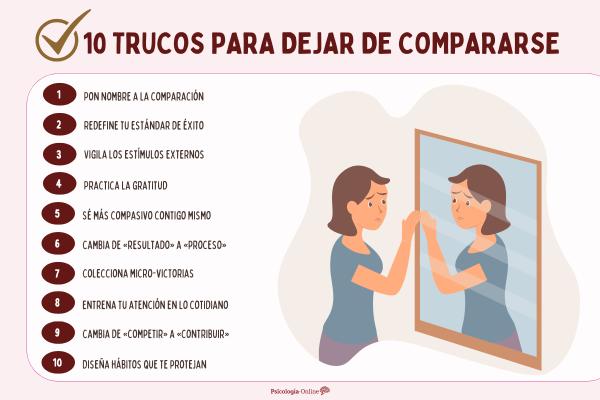Compare with others is natural and automatic, but the problem arises when we get trapped in it, since it drains energy, distorts self -image and moves away from our goals. The key is to develop a healthy relationship with the comparison: not eliminate it, but to use it constructively and avoid what hurts us, especially in an environment saturated with perfect achievements and perfect lives.
In fact, psychology explains this phenomenon for decades. The social comparison theory of psychologist Leon Festinger(1) He points out that we usually evaluate ourselves taking as reference to others. In moderate doses, this habit can be motivating; In excess, it generates discouragement, envy and paralysis. Without filters, the mind is saturated with impossible standards. Therefore, the work does not consist of “fighting your brain”, but in redesigning your mental and digital environment to recover control.
To do this, in this Psychology-online article we tell you 10 tips to stop comparing yourself to others.
Name the comparison
The first step to reduce the impact of the comparison is Identify the moment What do you start to think “Why don’t I …?” Label the thought as part of the social comparison. This gesture of full conscience or attention will prevent you from getting carried away by emotional whirlwind.
Then breathe deeply and ask yourself: «¿What emotion is behind: Fear, shame, sadness, envy? Naming what you feel will help you regulate your emotions and thoughts. Remember: it is not about repressing, but clearly seeing what happens to be able to choose your answer.
In this process you will also understand Why not compare with others It is key to your emotional well -being. Each person has their own rhythm and circumstances, and learning to recognize it will allow you to live more calmly and authenticity.
Here we explain “how to improve self -esteem.”
Redefine your success standard
If you measure your life with another person’s marker, you are very likely to lose. Instead, create your personal marker: Establish three main values and two goals that depend exclusively on you.
For example:
- Learning.
- Inner peace.
- Job stability
When your success is defined by controllable actions (How to read 20 minutes a day, train 4 times a week or maintain a friendship relationship), the comparison loses strength, since your focus goes from “external results” to internal coherence.
In addition, understand the consequences of comparing with others It will allow you to become aware of how this behavior affects your self -esteem and motivation, and why it is healthier to focus on your own advances.
Watch external stimuli
Your mind is permeable to the environment. So make an honest analysis of what chats, accounts, podcasts or environments fire that negative comparison. Stop continuing or silence What hurts and enhances what inspires you, without pressure. Pon limits to the use of social networks And, if necessary, establish schedules to connect to the Internet instead of opening applications by inertia. If you reduce exposure, you will reduce the trigger.
This is a fundamental step to learn how to stop comparing myself with other women, because much of the comparison arises from the constant exposure to unreal lives and standards.
In the next post of psychology-online we explain “how networks affect your self-esteem and what to do about it.”
Practice gratitude
Gratitude is not to deny the difficult, but to recognize how valuable there is at this time in your life. Every night, write three concrete facts of the day for those who feel grateful and write down What they contributed to you (For example, talking to X person made me feel understood when I was worse).
This “why” trains your brain to detect resources instead of deficiencies and to focus on what you have and do instead of what happens to others.
Be more compassionate with yourself
When the comparison hurts, he practices the “self -pity triad.” Self -pity or the ability to be friendly, understanding and kind with oneself reduces self -criticism and cushions the wound to measure us with others.
- Mindfulness or recognize what you feel: «This is difficult. I feel insecure ».
- Shared humanity: «I am not the only one who feels/thinks of these things. We all compare ourselves ».
- Goodness: “What would you need to hear from a good friend now?” or “What would you advise a friend if he felt like me?”
Change “result” to “process”
The comparison can be paralyzing when you transport yourself to the final results ahead of time: the ascent, the medal, the photo of the “after.” So it rentates your attention to the process and focus exclusively in practice, feedback, rest, constancy.
You can even make your effort visible through metricssuch as minutes of study, written pages or kilometers traveled. When you celebrate the next step, motivation is activated intrinsic and decreases comparison and the need for external validation.
Micro-Victoria collection
As we have seen, the comparison usually goes against us. To avoid it, Write tiny achievements every dayeven when it seems that they lack value, such as stretching or meditating 5 minutes a day, passing the vacuum when you do not feel like it or say “no” to something you did not want.
Then choose one day of the week to Check your notes. This strategy to stop comparing yourself with others is an antidote for that feeling of “no progress.”
Train your attention to everyday life
The mindfulness is not only to meditate, but return to the present in the small things, such as washing your hands appreciating the water, walking feeling the soles of the feet or eating without screens, attentive to the flavors.
This apparently simple practice, Train your brain not to hook to the first comparative thought that appears. When your mind jumps to “them,” returns your focus to “this” and “now.” Your life happens here, not in the lives of other people.
Change “compete” to “contribute”
A very useful technique to stop comparing yourself to others is to go from “How do I show that I am worth?” to “How can I contribute to others?” So, every morning, ask yourself what is the smallest action with which I can improve someone (even me).
It can be from thanking or teaching what you know until asking for help from humility. Contribute to society creates connection and meaning, and this disables the obsession that we sometimes feel for the hierarchy.
Design habits that protect you
Finally, if you want to stop comparing yourself to others, do not trust only the willpower. Define kind consequences with yourself. For example, if you open Instagram and start comparing yourself, you can close the app and do 10 deep breaths And aware or if you see someone’s achievement and start punishing you, Write your own micro-victoria And continue with your life. Repeat this script to automate it.
This article is merely informative, in Psychology-online we have no power to make a diagnosis or recommend a treatment. We invite you to go to a psychologist to treat your particular case.
If you want to read more articles similar to How to stop comparing yourself to others: 10 tips we recommend that you enter our category of social psychology.
References
- Festinger, L. (1954). A Theory of Social Comparison Processions. Human Relations, 7 (2), 117-140.
Literature
- Brown, KW, Ryan, RM (2003). The Being Being Present: Mindfulness and its Role in Psychological Well-Being. Journal of Personality and Social Psychology, 84 (4), 822–848.
- Emmons, RA, McCullough, Me (2003). Counting Blessings versus Burdens: An Experimental Investigation of Gratitude and Subjective Well-Being in Daily Life. Journal of Personality and Social Psychology, 84 (2), 377–389.
- Neff, KD (2011). Self-Compassion: The Proven Power of Being Kind To Yourself. William Morrow.
- MSC. The three components of self -pity. Retrieved from: https://www.mindfulnessSyautocompasion.com/componentes-de-la-autocompasion













